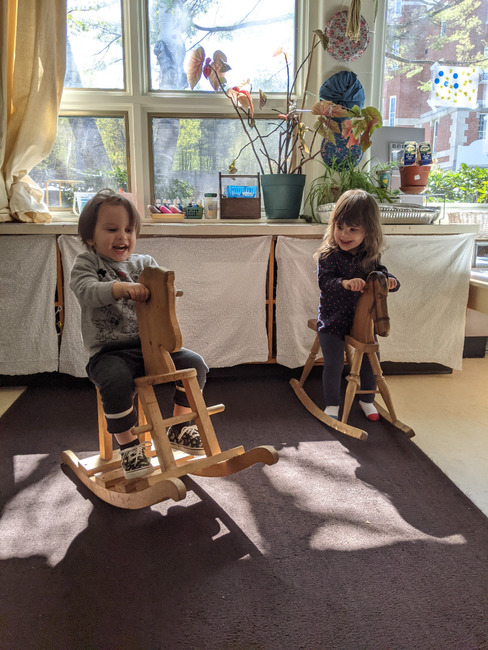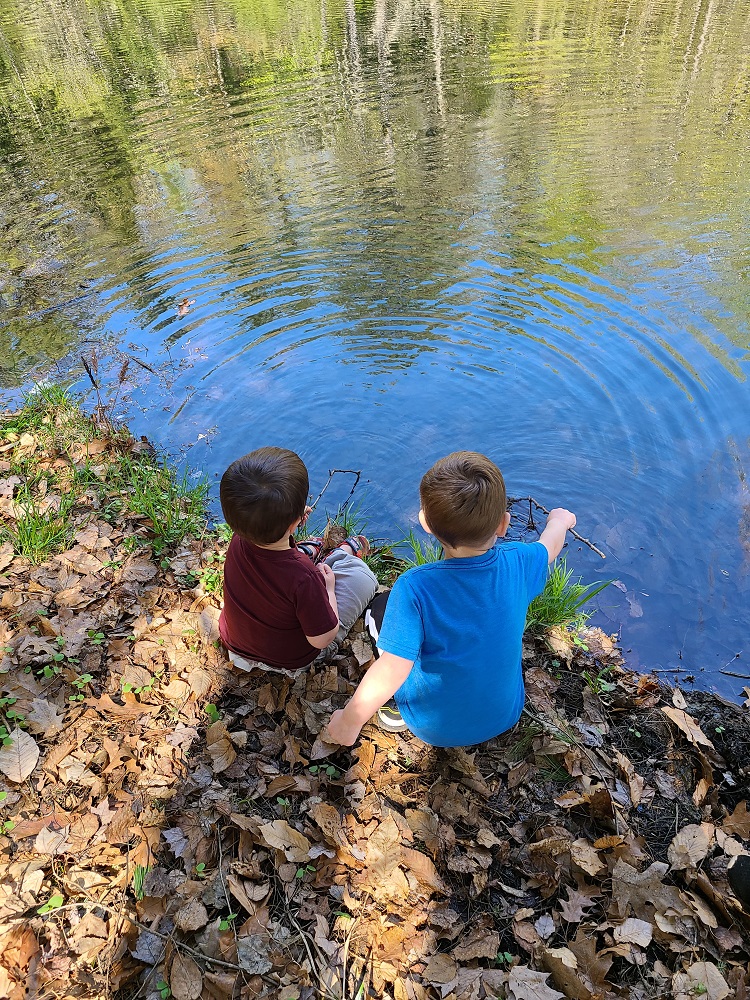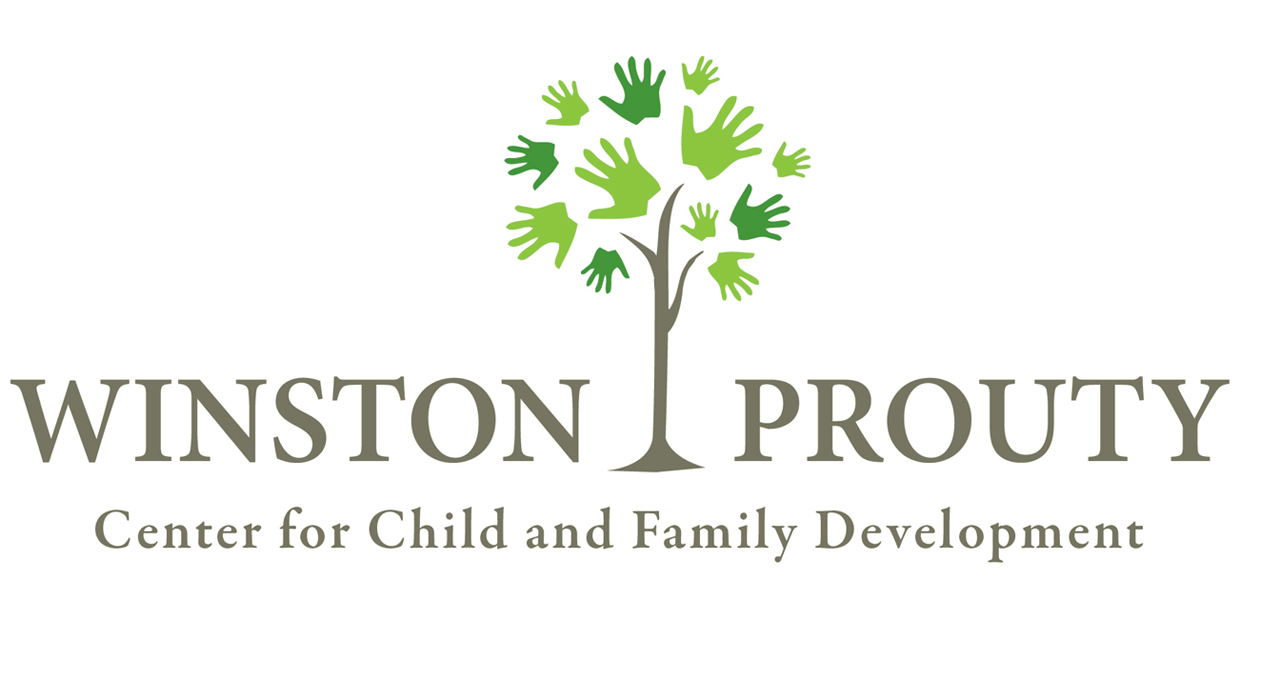Early Learning Center
We regard children as capable, strong and autonomous. We believe that they are observers who approach the world with curiosity and a desire to learn. We believe in their capacity to be problem-solvers who can think creatively and work collaboratively. We believe that children, like all of us, are seeking to find ways to belong, and need time and space to express their emotions. We strive to create a joyful, predictable, caring and authentic environment, in which they can explore, learn and grow fully into the unique and important individuals that they are.
History
The Early Learning Center (ELC) was established as a childcare program in 1986. The ELC is an inclusive early education program serving infants to preschool-aged children. We use the Roots Approach, which is influenced by the work of Magda Gerber/Emmi Pickler/RIE®, Early MTSS, CSEFEL Pyramid Model, and Brazelton Touchpoints. The Roots Approach is Responsive, Respectful, Relationship-based, Reflective Early Care and Education.

- Responsive: We believe that careful observation and attention in all our interactions leads to authentic and intentional responses.
- Respectful: We believe that all people—children, families, caregivers, colleagues—deserve respect. We recognize and value our unique perspectives, differences, and commonalities. In our interactions, we strive to try to understand each other, to build on strengths, and assume competence no matter the age.
- Relationship-based: We believe that healthy relationships are integral to healthy development, at every age and stage. Healthy relationships are reciprocal and respectful.
- Reflective: We believe that reflection begins with curiosity. Reflective practitioners try to understand, ask questions, and remain open to feedback and change. Reflection may happen in the moment, before, or after an interaction, offering an opportunity to be more intentional in future interactions and help to build relationship and competence.
Philosophy
We regard children as capable, strong, and autonomous. We believe that they are observers who approach the world with curiosity and a desire to learn. We believe in their capacity to be problem-solvers who can think creatively and work collaboratively. We believe that children, like all of us, are seeking to find ways to belong, and need time and space to express their emotions. We strive to create a joyful, predictable, caring, and authentic environment, in which they can explore, learn, and grow fully into the unique, important, valuable individuals that they are. – Statement Created by the ELC Teachers in December of 2021
It is our goal that each child will:
- Feel secure and important in our community
- Develop skills in relationships with both adults and children, and in particular the abilities to initiate and sustain interaction with others in meaningful ways, form friendships; resolve conflict with increasing independence and confidence, demonstrate empathy for others, recognize and regulate emotions and take pride in their accomplishments
- Develop large and small motor skills, self-care skills and expressive and receptive language skills
- Develop cognitive skills including the abilities to make logical connections, make purposeful decisions, sustain, and shift attention, make predictions, and solve problems flexibly
- Explore and create freely in an environment that accepts and integrates individual and cultural differences in learning styles, interests, and values
It is our goal that each family will:
- Feel confident that their child’s developmental needs are being consistently met at school
- Be aware of how to best support their children’s development at home
- Grow in their capacity to recognize and advocate for their child’s best interests
- Participate fully in the life of the Prouty community
Curriculum
Lead Teachers have primary responsibility for implementing a curriculum in keeping with the program’s educational philosophy and the Vermont Early Learning Standards (VELS). When it comes to learning, we strive for “depth” rather than “breadth” as we encourage children to revisit and reflect upon their experiences as they build relationships- with each other, with themselves, with materials, and with the world around them-that form the basis of learning about what it means to be human. In contrast with more traditional curriculum models which change frequently and try to touch on a broad range of potentially disconnected topics, this model of curriculum allows the teachers to focus more deeply on what is emerging in the study of one topic. This means that you may see a curriculum that reflects a single topic for weeks, months or even an entire year.
As professionals in the field of early childhood education our teachers understand each of the domains of learning and are familiar with the required standards. They use this knowledge alongside their observations of the children and their interests to collaborate with their colleagues in finding ways to incorporate each of the domains into the learning and play experiences that they develop for the children each week.

While our lead teachers generally have more experience and hold overall responsibility for the classroom, our schedule provides opportunities for both teachers to meet together to reflect on their observations of the children, their learning and their interests, and to plan together for next steps, and we expect all of our teachers to work together as a team to provide care and education to the children in our center.
Weekly curriculum plans are posted outside of each classroom and incorporate technology only when indicated in an educational plan for a specific child or when enhancing children’s understanding of a topic, as in the example of children who make a video of their classroom caterpillar turning into a butterfly and then use the video to share the news of this event with others. We do not use battery-operated toys and avoid commercial images in the classroom.
Family Participation and Communication
We encourage families to be involved with the program. We will inform parents of opportunities such as work parties, sharing a talent or tradition with a classroom, helping to plan curriculum projects, organizing family events, donating requested items and either planning or attending special programs that offer support and education for families. Families can speak with a classroom teacher or the ELC Program Director to offer suggestions.
Family-Teacher Conferences are held twice each year. Families have the option of scheduling the first of these conferences as a home visit, which provides teachers and families with an opportunity to get to know one another better in the child’s primary environment. Often, this allows teachers to learn about the child’s home culture and experiences, which can be later integrated in classroom activities. Each of these conferences provides an opportunity to discuss in-person the child’s progress, answer questions that parents might have about what they can expect in the next stage of their child’s development and discuss any relevant concerns. A primary purpose of these conferences is to allow teachers and families to collaborate on setting individual goals for children that will inform teaching and assessment.
Families are always welcomed and encouraged to discuss questions and concerns as they arise with either the classroom teaching team or the ELC Program Director. In turn, families can expect that the program will keep them informed of their child’s progress, day-to-day needs and major concerns on an ongoing basis through daily or weekly classroom notes, in-person conversation at drop-off and pick-up, the Brightwheel app, and phone calls and e-mail as needed.
For more information
Follow the links below or please contact our ELC Program Director, Honor Woodrow, honor@winstonprouty.org.
